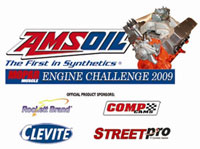Why You Shouldn't Run Racing Oil in Your Vehicle
Here’s a line of reasoning you can sometimes hear from gearheads and other enthusiasts:
1. Racing engines are more severe than my engine.
2. Racing engines use racing oil.
3. Therefore, I should use racing oil in my vehicle for best protection.
It’s true that your average racing engine creates operating conditions more severe than the average passenger car engine.
However, that’s not to say that modern engines aren’t tough on oil.
The last couple years, we’ve been telling you about the toll today’s engines take on motor oil.
The turbocharged direct injection engines in modern vehicles generate increased heat and contaminants compared to their predecessors.
Motor oil bears the brunt of the added stress.
That’s why industry motor oil specifications keep growing tougher and automakers are increasingly recommending synthetic oils to meet these strict performance specs.
Racing, however, is a whole different animal. The powerful modified engines in racing vehicles produce extreme heat and pressures your average car or truck simply will never see.
Scott Douglas’ 900hp pro 4x4 race truck can produce engine temperatures in excess of 300 degrees.
Engine temperatures in a typical passenger car/light truck fall somewhere between 195 and 220 degrees.
The difference is even more striking when you consider that the rate of motor oil oxidation doubles for every 18 degree increase in oil temperature.
The tremendous shearing forces the oil bears as it’s squeezed between the interfaces of the pistons/rings and cam lobes/lifters pose another problem.
The pressure can tear apart the molecular structure of the oil, reducing its viscosity and film strength.
Racing oil has to be formulated differently to protect these demanding engines.
Even so, it doesn’t mean you should order a case of AMSOIL DOMINATOR Synthetic Racing Oil for your car.
Why? For starters, racing oils are changed frequently. Most professionals change oil every couple races, if not more frequently.
For that reason, racing oils are formulated with a lower total base number (TBN) than passenger car motor oils.
TBN is a measure of the oil’s detergency properties and its ability to neutralize acidic byproducts.
Oils with longer drain intervals have higher TBNs. AMSOIL Signature Series Synthetic Motor Oil features a TBN of 12.5 to enable its 25,000 mile/one year drain interval.
In contrast, DOMINATOR Synthetic Racing Oil has a TBN of 8 since we recommend changing it more often.
As great as it performs on the track, DOMINATOR is not what you want in your engine when you’re driving thousands of miles and several months between oil changes.
Second, you want to use an oil in your daily driver that excels in several performance areas:
- Wear protection
- Long oil life
- Maximum fuel economy
- Engine cleanliness
- Corrosion protection
- Oxidation resistance
- Easy cold-temp starts
Motor oil additives produce many of these benefits for example, antioxidant additives fight heat and extend service life.
Anti-wear additives interact with the metal surfaces of engine parts and guard against metal to metal contact.
Many additives form layers on metal surfaces. That being the case, they compete with each other for space, so to speak, like pigs competing for room at the trough.
Racing oils are often formulated with a heavy dose of friction modifiers to add lubricity for maximum horsepower and torque.
The boosted level of additives meant to increase protection and performance during a race doesn’t leave room in the formulation for additives found in passenger car motor oils that help maximize fuel economy, fight corrosion of improve cold weather protection.
In effect, the ravenous pigs at the trough leave no room for their brethren resulting in a less well rounded formulation.
Achieving the tasks of a passenger car motor oil requires a finely balanced formulation.
Too much or too little performance in one area can negatively affect other areas – and the oil’s overall protection and performance.
The list of tasks required of a racing oil, however, is much shorter. The right tool for the right job is an axiom with which you’re familiar.
The same holds for motor oil. It’s best to leave racing oil to competition engines and use a properly formulated passenger car motor oil for your daily vehicle.
For more information on this topic or any other question you may have feel free to contact me.
If you are interested in becoming an AMSOIL dealer follow the link below to get started.
Sincerely,
Jesse Hull
Mechanical Engineer
AMSOIL Direct Jobber
913-713-8850 | Privacy Policy









